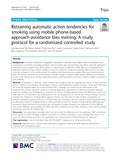Zitierlink:
http://dx.doi.org/10.25819/ubsi/9931Dateien zu dieser Ressource:
| Datei | Beschreibung | Größe | Format | |
|---|---|---|---|---|
| Retraining_automatic_action_tendencies_for_smoking.pdf | 788.96 kB | Adobe PDF |  Öffnen/Anzeigen |
| Dokumentart: | Article | Titel: | Retraining automatic action tendencies for smoking using mobile phone-based approach-avoidance bias training: a study protocol for a randomized controlled study | AutorInn(en): | Machulska, Alla Kleinke, Kristian Eiler, Tanja Joan Grünewald, Armin Brück, Rainer Jahn, Katharina Niehaves, Bjoern Gethmann, Carl Friedrich Klucken, Tim |
Institut: | Department Erziehungswissenschaft · Psychologie | Schlagwörter: | Approach bias, Cognitive bias modification, Nicotine addiction, Randomized controlled trial, Smartphone apps | DDC-Sachgruppe: | 150 Psychologie | GHBS-Notation: | HVQH VYH |
Erscheinungsjahr: | 2019 | Publikationsjahr: | 2021 | Auch erschienen: | Trials ; 20, Article number 720. - https://doi.org/10.1186/s13063-019-3835-0 | Zusammenfassung: | Background Automatic tendencies to approach drug-related cues have been linked to the development and maintainance of harmful drug-taking behavior. Recent studies have demonstrated that these automatic approach tendencies can be targeted directly by means of cognitive bias modification (CBM). Moreover, changing those approach tendencies may enhance treatment outcomes. However, training and therapy effects tend to be rather small and adherence to the training might be impaired by time-consuming multiple laboratory training sessions. Here, we present a protocol for a randomized controlled design to improve CBM training efficiency and facilitate access to the training by providing mobile-phone-based training sessions at home to current smokers motivated to quit smoking. Methods Participants (n = 100) are current smokers who smoke at least six cigarettes per day for at least 6 months and are willing to quit smoking. All participants attend a brief behavioral smoking cessation intervention (TAU) and are randomly assigned either to an experimental (TAU + training) or a control group. Participants in the experimental condition are given access to a training application (app) aimed at retraining automatic approach biases for smoking cues. Participants are instructed to perform the app training outside the laboratory context on a daily basis for 14 consecutive days. Participants in the control group do not receive the training. Primary outcome measures are changes in smoking-related approach biases and reductions in daily nicotine consumption as assessed at baseline, post-training and at 6-week follow up. Secondary outcome measures include approach biases for alternative stimuli or smoking stimuli to which participants were not exposed during training, attentional and association biases, biochemical outcomes, and self-reported smoking behavior, also measured at three different time points (baseline, post-training, and follow up). After completion of the study, smokers in the control condition will receive access to the training app. Discussion This randomized controlled trial is the first to test the effectiveness of an app-based CBM intervention as an adjunct to a brief smoking cessation intervention in smokers motivated to quit smoking. The results of this study can inform future research in the optimization and advancement of CBM treatment for addiction. |
Beschreibung: | Finanziert aus dem DFG-geförderten Open-Access-Publikationsfonds der Universität Siegen für Zeitschriftenartikel |
DOI: | http://dx.doi.org/10.25819/ubsi/9931 | URN: | urn:nbn:de:hbz:467-19199 | URI: | https://dspace.ub.uni-siegen.de/handle/ubsi/1919 |
| Enthalten in den Sammlungen: | Geförderte Open-Access-Publikationen |
Diese Ressource ist urheberrechtlich geschützt. |
Seitenansichten
491
checked on 25.12.2024
Download(s)
69
checked on 25.12.2024
Google ScholarTM
Prüfe
Prüfe
Alle Ressourcen in diesem Repository sind urheberrechtlich geschützt, soweit nicht anderweitig angezeigt.

